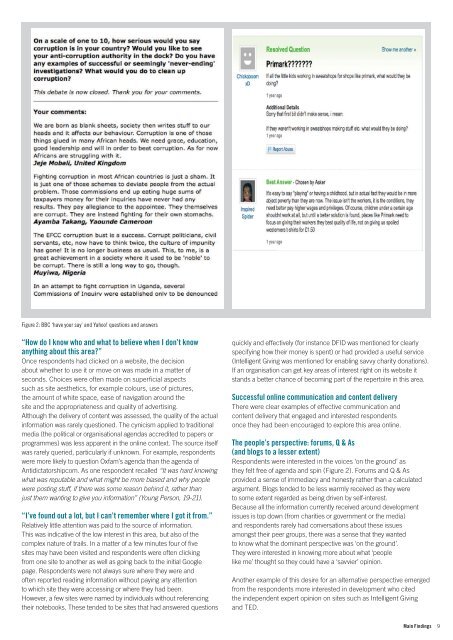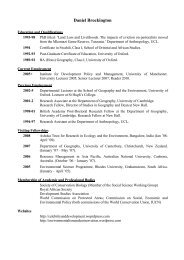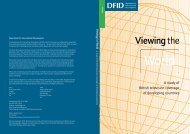The World Online How UK citizens use the internet to find out about ...
The World Online How UK citizens use the internet to find out about ...
The World Online How UK citizens use the internet to find out about ...
- No tags were found...
You also want an ePaper? Increase the reach of your titles
YUMPU automatically turns print PDFs into web optimized ePapers that Google loves.
Figure 2: BBC ‘have your say’ and Yahoo! questions and answers“<strong>How</strong> do I know who and what <strong>to</strong> believe when I don’t knowanything ab<strong>out</strong> this area?”Once respondents had clicked on a website, <strong>the</strong> decisionab<strong>out</strong> whe<strong>the</strong>r <strong>to</strong> <strong>use</strong> it or move on was made in a matter ofseconds. Choices were often made on superficial aspectssuch as site aes<strong>the</strong>tics, for example colours, <strong>use</strong> of pictures,<strong>the</strong> amount of white space, ease of navigation around <strong>the</strong>site and <strong>the</strong> appropriateness and quality of advertising.Although <strong>the</strong> delivery of content was assessed, <strong>the</strong> quality of <strong>the</strong> actualinformation was rarely questioned. <strong>The</strong> cynicism applied <strong>to</strong> traditionalmedia (<strong>the</strong> political or organisational agendas accredited <strong>to</strong> papers orprogrammes) was less apparent in <strong>the</strong> online context. <strong>The</strong> source itselfwas rarely queried, particularly if unknown. For example, respondentswere more likely <strong>to</strong> question Oxfam’s agenda than <strong>the</strong> agenda ofAntidicta<strong>to</strong>rshipcom. As one respondent recalled “It was hard knowingwhat was reputable and what might be more biased and why peoplewere posting stuff, if <strong>the</strong>re was some reason behind it, ra<strong>the</strong>r thanjust <strong>the</strong>m wanting <strong>to</strong> give you information” (Young Person, 19-21).“I’ve found <strong>out</strong> a lot, but I can’t remember where I got it from.”Relatively little attention was paid <strong>to</strong> <strong>the</strong> source of information.This was indicative of <strong>the</strong> low interest in this area, but also of <strong>the</strong>complex nature of trails. In a matter of a few minutes four of fivesites may have been visited and respondents were often clickingfrom one site <strong>to</strong> ano<strong>the</strong>r as well as going back <strong>to</strong> <strong>the</strong> initial Googlepage. Respondents were not always sure where <strong>the</strong>y were andoften reported reading information with<strong>out</strong> paying any attention<strong>to</strong> which site <strong>the</strong>y were accessing or where <strong>the</strong>y had been.<strong>How</strong>ever, a few sites were named by individuals with<strong>out</strong> referencing<strong>the</strong>ir notebooks. <strong>The</strong>se tended <strong>to</strong> be sites that had answered questionsquickly and effectively (for instance DFID was mentioned for clearlyspecifying how <strong>the</strong>ir money is spent) or had provided a <strong>use</strong>ful service(Intelligent Giving was mentioned for enabling savvy charity donations).If an organisation can get key areas of interest right on its website itstands a better chance of becoming part of <strong>the</strong> reper<strong>to</strong>ire in this area.Successful online communication and content delivery<strong>The</strong>re were clear examples of effective communication andcontent delivery that engaged and interested respondentsonce <strong>the</strong>y had been encouraged <strong>to</strong> explore this area online.<strong>The</strong> people’s perspective: forums, Q & As(and blogs <strong>to</strong> a lesser extent)Respondents were interested in <strong>the</strong> voices ‘on <strong>the</strong> ground’ as<strong>the</strong>y felt free of agenda and spin (Figure 2). Forums and Q & Asprovided a sense of immediacy and honesty ra<strong>the</strong>r than a calculatedargument. Blogs tended <strong>to</strong> be less warmly received as <strong>the</strong>y were<strong>to</strong> some extent regarded as being driven by self-interest.Beca<strong>use</strong> all <strong>the</strong> information currently received around developmentissues is <strong>to</strong>p down (from charities or government or <strong>the</strong> media)and respondents rarely had conversations ab<strong>out</strong> <strong>the</strong>se issuesamongst <strong>the</strong>ir peer groups, <strong>the</strong>re was a sense that <strong>the</strong>y wanted<strong>to</strong> know what <strong>the</strong> dominant perspective was ‘on <strong>the</strong> ground’.<strong>The</strong>y were interested in knowing more ab<strong>out</strong> what ‘peoplelike me’ thought so <strong>the</strong>y could have a ‘savvier’ opinion.Ano<strong>the</strong>r example of this desire for an alternative perspective emergedfrom <strong>the</strong> respondents more interested in development who cited<strong>the</strong> independent expert opinion on sites such as Intelligent Givingand TED.Main Findings9





